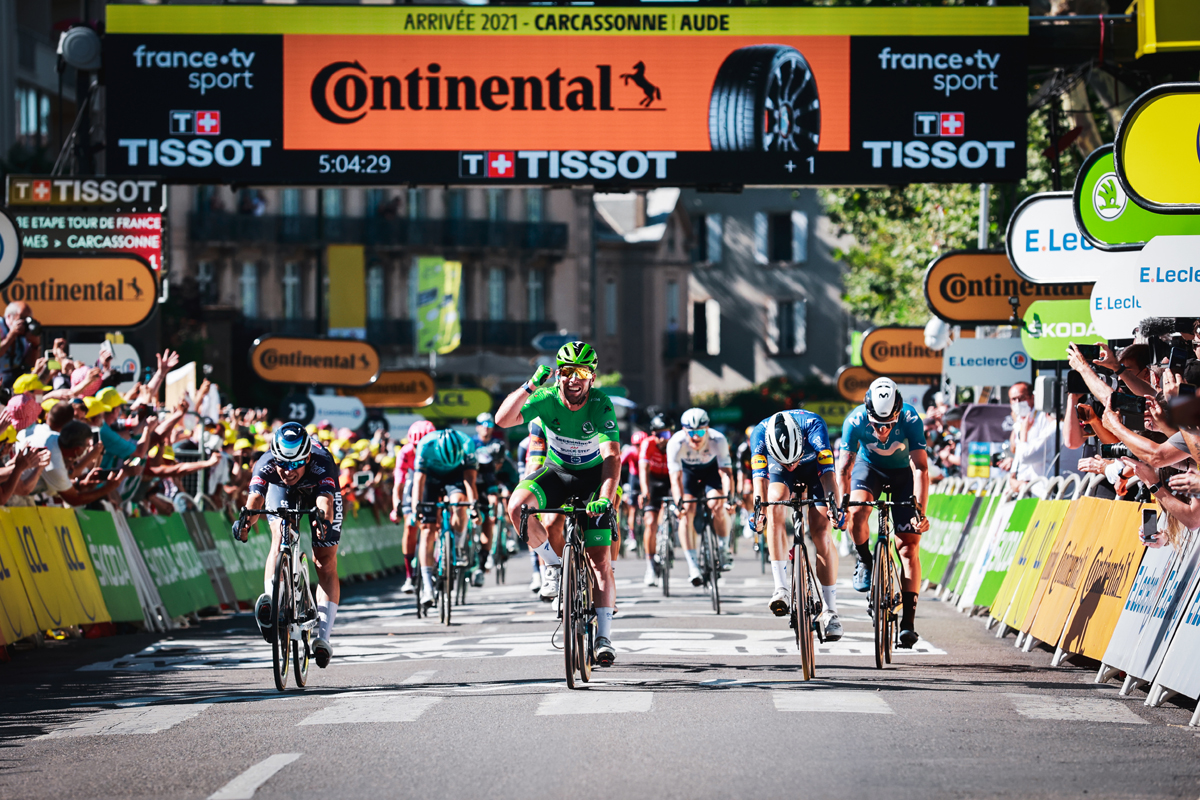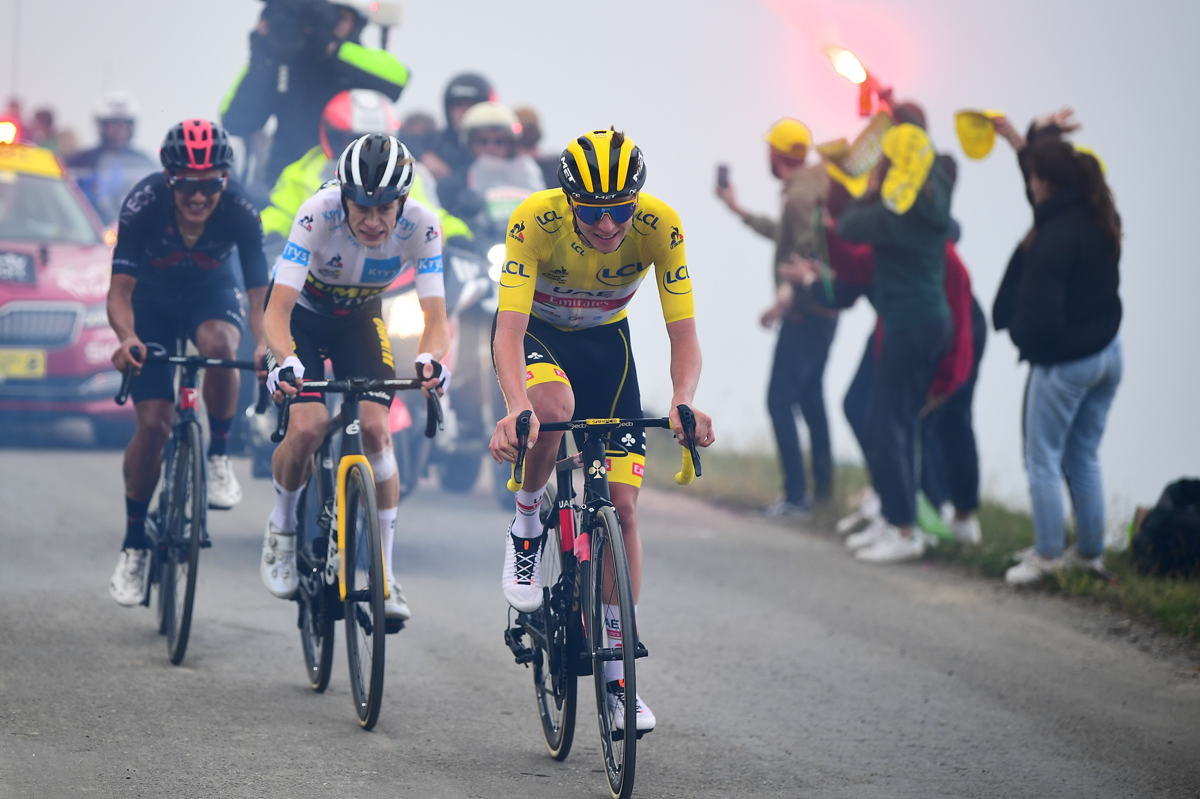By David Ward — The major story from this year’s Tour de France is, of course, the remarkable return of Mark Cavendish. Following that is Tadej Pogačar’s domination and overall victory. But a more subtle and yet compelling take-away is the cementing of the emergence of a new generation in the pro peloton.
First, Mark Cavendish. Everyone knows the story: Cavendish was gifted a slot on the Deceuninck-Quick Step team when it appeared his career might be over, and then he was tapped for the Tour as a last-minute substitute for the injured Sam Bennett. Cavendish then went on to stun everyone with four classic Cavendish sprint victories, the last equaling Eddy Merckx’s record of 34 Tour de France stage wins.

I can only imagine the overwhelming emotion Cavendish felt when he won his first stage in this year’s Tour. Only a year ago he thought his career might be over, and only a year ago, indeed only a week before this year’s Tour started, he likely thought he would never be in the Tour again. So when he won Stage 3’s sprint, the professional and emotional satisfaction he felt was clearly clear, captured by the cameras for us all to see, and we all cheered him. It is the kind of comeback story we all love and cherish.
While his next two sprint wins in Stages 6 and 10 were exciting, they also built anticipation for the victory that would equal Merckx’s record. And while these first three wins were classic sprint victories with Cavendish being pulled to victory by the best lead-out train in the pro peloton, the record-tying win in Stage 13 was a great example of turning a difficult and sketchier sprint into victory. Indeed, with just a couple of hundred meters to the finish, Cavendish appeared poorly positioned and I was certain a record-tying attempt would have to wait for another day. But his instincts and his lead-out man, Michel Morkov, managed to navigate the charging chaos and deliver Cavendish to the finish line for a thrilling victory. It seemed a fitting way to tie Merckx’s record.
The Tour’s final stage on the Champs-Elysées was anticlimactic as Cavendish did not grab the win. While the world, or at least the cycling world, waited anxiously and hopefully for Cavendish to break Merckx’s record, he and his team were both outmaneuvered, and frankly Cavendish was simply outsprinted, by Wout Van Aert and Jumbo-Visma to snatch the victory, and deny and deflate all our hopes for Cavendish’s Cinderalla ending. His attempt to break the record will have to wait another year, and I hope, with everyone else, I’m sure, that Mark will be back and in top form to set a record that, could potentially never be broken.
For Tadej Pogačar, Cavendish’s return to glory and the anticipation of him tying and possibly breaking Merckx’s record overshadowed what was a very dominating overall victory in the Tour. Pogačar virtually sealed the overall victory on Stage 9, a stage he did not even win but rather placed 4th. But he put on show of real strength when he dropped Richard Carapaz, Rigoberto Uran, Jonas Vingegaard and all other pretenders to gain over three minutes on them and secure the yellow jersey, to never be relinquished. While there was a lot of talk of trying to overtake Pogačar, his victory was understood by all, barring a fantastic implosion, crash or other unfortunate circumstance, to be virtually assured.

And a deserving winner he is. While he didn’t win Stage 9, he did win the Stage 5 time trial, and then impressively won both Stages 17 and 18 with mountain top finishes at, respectively, Saint Lary-Soulan and Luz Ardiden. He matched all attacks by those trying to distance him and with a real show of strength sprinted to the finish of, and victory in, each stage. He clearly stamped the 2021 Tour de France as his.
Now we are getting prognostications of multiple Tour victories, a dominance of the peloton for years to come, and even comparisons to the great Eddy Merckx. All premature. But Pogačar has shown consistency and a love for racing. Time will tell.
Finally, this year’s Tour underscored and highlighted what most of us had suspected for the last couple of years: The rise of a new generation. Beginning with Egan Bernal in 2019 and continuing with Pogačar’s victories in 2020 and this year, I believe the old guard of Chris Froome, Richie Porte, Vincenzo Nibali, Geraint Thomas and others are on the downslide. While there may be some minor resurgences (think Mark Cavendish), this new generation is young, strong and hungry to be at the top.
This is underscored by a number of other showings in the Tour. First, how about Wout Van Aert? He wins the most grueling mountain stage with two passes over Mont Ventoux. He wins the final time trial. And he wins on the Champs-Elysées, the Tour’s biggest sprint prize (for which, while I really like him, I was extremely frustrated with him at the time for beating Cavendish as I really wanted Cavendish to win). I don’t think he is going to be fighting for Grand Tour victories, but his ability to win in all three disciplines makes him a better comparison to Merckx than anyone else.
Then there are both Richard Carapaz and Jonas Vingegaard who took the third and second spots, respectively, on the podium below Pogačar. Egan Bernal just won this year’s Giro d’Italia to add to his Tour Victory in 2019. And there are a host of young sprinters, led by Caleb Ewan, eager to contest those chaotic sprint finishes.
Watching the Tour with its overall aspirations, individual stages and many subplots makes for exciting bike racing at its more elevated and professional level. And a new generation is going to keep it exciting for years to come.
What a great way to spend a hot July.








